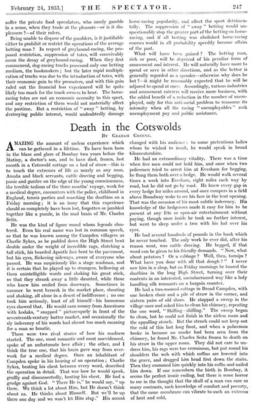Death in the Cotswolds
BY GRAHAM GREENE.
AMAZING the amount of useless experience which can be gathered in a lifetime. To have been born in the blaze and glare of Bombay two years before the Mutiny, a doctor's son, and to have died, frozen, last month in a Cotswold cottage on a bed of straw—this is to touch the extremes of life as nearly as any man. Amahs and black servants, cattle droving and begging, panic and gunfire on the edge of the young consciousness, the terrible tedium of the three months' voyage, work for a medical degree, encounters with the police, childhood in England, tennis parties and searching the dustbins on a Friday morning ; it is an irony that this experience should so completely have been lost, forgotten or jumbled together like a puzzle, in the mad brain of Mr. Charles Seitz.
He was the kind of figure round whom legends clus- tered. Even his real name was lost in common speech, so that he was known among the Campden villagers as Charlie Sykes, as he padded down the High Street bent double under the weight of incredible rags, clutching a tall stick, his bearded Apostle face bent to the pavement, but his eyes, flickering sideways, aware of everyone who passed. He was suspiciously like a stage madman, and it is certain that he played up to strangers, bellowing at them unintelligible words and shaking his great stick, so that they shrank away a little daunted, while those who knew him smiled from doorways. Sometimes in summer he went berserk in the market place, shouting and shaking, all alone in a desert of indifference ; no one took him seriously, least of all himself—his humorous eyes showed that. He would earn money from Americans with kodaks, " snapped " picturesquely in front of the seventeenth-century butter market, and occasionally the sly indecency of his words had almost too much meaning for a man so lunatic.
There were two rival stories of how his madness started. The one, most romantic and most unevidenced, spoke of an unfortunate love affair ; the other, and I think the true one, that his brain gave way from over- work for a medical degree. Once an inhabitant of Campden spoke in his hearing of an operation ; Charlie Sykes, beating his chest between every word, described the operation in detail. That was how lie would speak, gruffly and disconnectedly, beating his chest. He had a grudge against God. " There He is," he would say, " up there. We think a lot about Him, but He doesn't think about us. He thinks about Himself. But we'll be up there one-day and we won't let Him stay." His accent changed with his audience : to some pretentious ladies whom he wished to insult, he would speak in broad Gloucestershire.
He had an extraordinary vitality. There was a time when five men could not hold him, and once when two policemen tried to arrest him at Evesham for begging, he flung them both over a hedge. He would walk several times a week into Evesham, eight miles each way by road, but he did not go by road. He knew every gap in every hedge for miles around, and once campers in a field above Broadway woke to see his face in the tent opening. That was the occasion of his most subtle indecency. His knowledge of the hedgerows made it easy for him to be present at any fete or open-air entertainment without paying, though once inside he took no further interest, but went to sleep under a tree with his hat over his eyes.
He had several hundreds of pounds in the bank which lie never touched. The only work he ever did, after his reason went, was cattle droving. He begged, if that word can be given to his friendly demands. " Now, what about potatoes ? Or a cabbage ? Well, then, turnips ? What have you done with all that dough ? " I never saw him in a shop, but on Friday mornings he toured the dustbins in the long High Street, turning over their contents in an interested, unembarrassed way like a lady handling silk remnants on a bargain counter.
He had a two-roomed cottage in Broad Campden, with one broken chair and a pile of straw in the corner, and sixteen pairs of old shoes. He stopped a sweep in the village once and asked him to clean his chimney, repeating the one word, " Shilling—shilling." The sweep began to clean, but he could not finish in the airless room and the appalling stench. But the stench could not keep out the cold of this last long frost, and when a policeman broke in because no smoke had been seen from the chimney, he found Mr. Charles Seitz frozen to death on his straw in the upper room. They did not care to un- dress him, his rags were too verminous, but put round his shoulders the web with which coffins are lowered into the grave, and dragged him head first down the stairs. Then they crammed him quickly into his coffin and nailed him down. If one remembers the birth in Bombay, it seems the perfect ironic ending, but there is some horror to me in the thought that the skull of a man can case so many contrasts, such knowledge of comfort and poverty, that the same membrane can vibrate to such an extreme of heat and cold.






































 Previous page
Previous page